“You should talk to a therapist”, said my best friend five years ago. “You think I’m mad” I retorted. “You’re not okay, I’m worried about you”, she said in a tone that sounded concerned.
It was a phase when I lost my father to severe cardiac arrest, I was struggling for a job, blaming others for my financial loss, low on some important vitamins and minerals in my body, was tired and irritated always, and I’d jump into arguments for any petty reason. Even after trying hard, I failed to bounce back to my happy, high-life state. Sometimes, it’s hard to recognize and break the negative patterns in your life.
There are times when you are confused between what is normal and not normal. Your thoughts, actions, and feelings may seem okay to you. But, when your loved ones say it’s not okay, you need to pause and think again.
Keeping aside the stigma and shame, I decided to talk to a therapist and it is the best decision of my life. That little extra professional help made it easier for me to cope with my life’s challenges, heal and grow. It’s never wrong to ask for help! You will feel less alone with your problems.
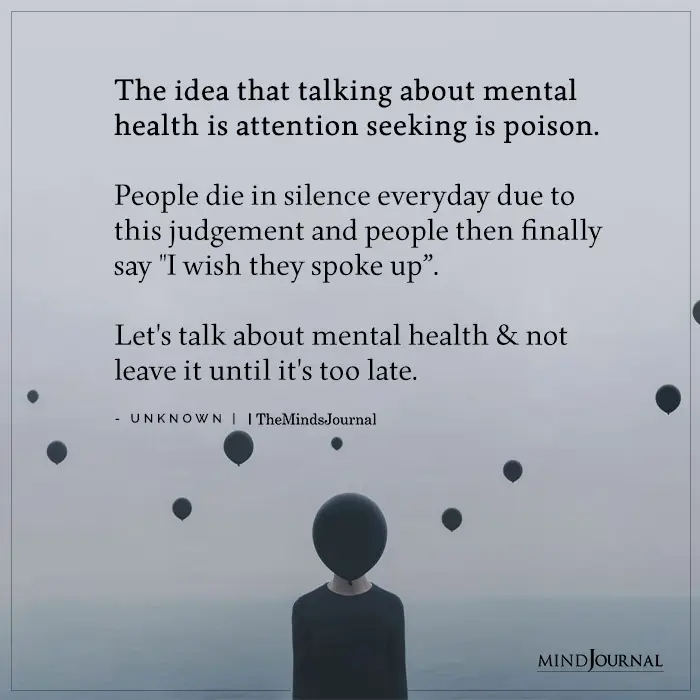
According to Dr Ramani Durvasula, a California-based licensed clinical psychologist, therapy means “an honest, objective and confidential space that allows a person to explore uncomfortable feelings, understand its root causes, place it in a context and learn coping skills to overcome those feelings.”
You might need help too, but you are unaware of it.
So, here are a few signs that it’s time for you to talk to a therapist.
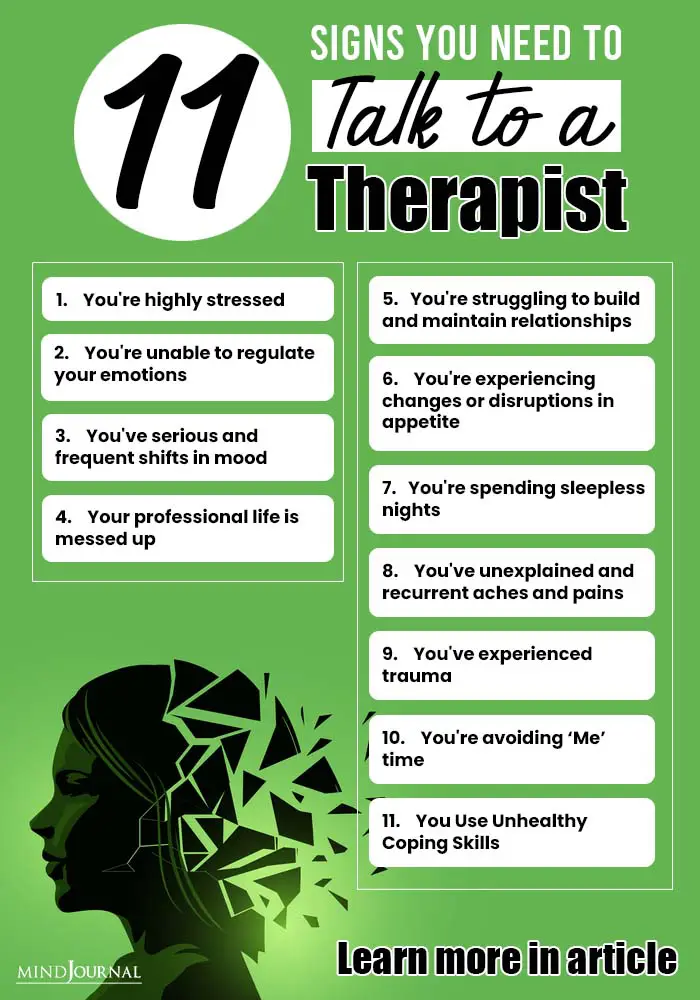
1. You’re highly stressed
Racing thoughts, constant worry, anger, irritability, restlessness, difficulty in performing activities of daily living, or problems at work/school or home are all signs of a mental health issue. Because these are the signs listed for nearly every diagnosis listed in the DSM-5, the mental health diagnostic manual.
When you are more stressed than usual, it is necessary to seek out help. Talking to a therapist will help you figure out if you are having anxiety, depression, or mania. Therapists are not just passive observers or listeners. Instead, they work hard on your behalf to bring understanding and relief in the context of a trusting relationship.
Related: 10 Secret Areas Where You Store Stress In Your Body
2. You’re unable to regulate your emotions
We all experience anger, excitement, frustration, anxiety, or low mood, but some people can well-manage them. You must have seen people giving witty replies even to the most embarrassing questions. And there are some who maintain a smiling face even during heated arguments. These are people who have mastered the art of emotional regulation.
People with poor emotional regulation may feel overwhelmed without any explanation. Anger is often a part of a depressive presentation but is often misinterpreted as short-temper. According to expert psychologists, a poorly regulated response to stress leads to uncontrolled anger. That is often linked with deeper issues in life, which can be explored with the assistance of a trained professional.
Counseling or talk therapy is designed to help you self-regulate your behavior and learn more adaptive ways to manage stress through active problem solving and relaxation strategies.
Related: 12 Common Mental Illness Signs You Should Never Ignore
3. You’ve serious and frequent shifts in mood
Having mood swings is quite normal. It is okay to feel sad or anxious sometimes. It can be due to a sudden rush of bad emotions or because you’re missing someone special. The matter is of serious concern if it persists for more than two weeks.
Prolonged mood-offs can leave you too exhausted even to manage your daily affairs. Self-help techniques like reading books, talking to friends, exercise may help you reverse the lethargy, sadness, or hopelessness feelings.
Otherwise, you must talk to a therapist to get clarity for the shift in your mood and energy. The therapist will bolster your resilience and help you find meaning in your life.
4. Your professional life is messed up
Reaching late to the office has become a new routine for you? Your boss is complaining about poor productivity? Your colleagues are asking you “are you okay?” or repeatedly telling you “you are not in yourself”? Planning to drop out of college due to low grades? Even a salary hike has failed to lift your spirits? Sure, you are not feeling at your best. It’s time to deal with underlying emotional and psychological issues killing your drive to work.
If you are disconnected from yourself, how can you be connected with your job? Popping pills can only boost your concentration and attention. But, what about motivation? And inner peace?
A therapist will help you gain an objective perspective and gain a professional opinion regarding what is causing your problems. And help you effectively treat them by designing a plan tailored to your specific needs. You will feel less guilty, more confident, and worthy of success.
5. You’re struggling to build and maintain relationships

Are you avoiding your old friends?
Having arguments with your partner?
Too reluctant to respond to calls and social media messages?
Get-together plans and late-night parties no more excite you?
Your relationships are strained, my friend! Because you are not happy with yourself. Hurry up, before things get worse.
“People are lonely because they build walls instead of bridges.” — Joseph F. Newton Men
If you don’t love yourself, how will you love others? In order to build a healthy relationship with others, you need to first maintain a healthy relationship with yourself.
Talking therapy or family counselling is the right choice. With the right tools, techniques, and support you will be able to improve your social skills, learn fair fighting, assertiveness, and resolve resentments. And, achieve more joy and satisfaction in your love and work relations.
Related: The 5 Inevitable Relationship Issues For Every Zodiac Sign
6. You’re experiencing changes or disruptions in appetite
The reason for mental agony can be anything, break up, loss of a job, death of a loved one, and so on. Different people have different coping skills when they are emotionally down! Some people eat a lot, while some lose their appetites.
Such changes in the eating pattern can result in unexplained weight loss or weight gain. Leaving your dietary changes unaddressed can open the door to bigger mental and physical health issues.
“A very large body of evidence now exists that suggests diet is as important to mental health as it is to physical health,” according to Felice Jacka, president of the International Society for Nutritional Psychiatry Research.
Talk to a therapist to nip the evil in the bud.
7. You’re spending sleepless nights
Just like sleeping too much is a sign of depression, staying awake for long hours is also a sign of a mental health issue. Anxiety and mania may cause sleeplessness. So, if you are sleeping too less or more than usual, it’s time to book an appointment with a therapist.
Spending sleepless nights for days may lead to insomnia, which can add to the stress, fatigue, and other physical health issues. It’s like a vicious cycle. Studies show that cognitive-behavioral therapy can effectively treat insomnia.
Related: Insomnia 101: Causes, Symptoms Of Insomnia & How To Sleep Better
8. You’ve unexplained and recurrent aches and pains
Research shows that different types of physical pain are actually associated with emotional problems. For example, headaches and migraines occur when you have troubled thoughts in your mind, neck pains are linked to holding grudges, feeling of solitude and rejection can give rise to upper back pain, pelvic pain is linked with sexuality and guilt, and so on. As you can see emotional distress can cause a host of physical symptoms.
Unfortunately, we don’t give the same priority to emotional pain as physical pain. Sure, it’s important to consult a physician to rule out any major physical health issue. In case, there are no known medical causes, you should talk to a therapist. Therapy can help you both physically and mentally.
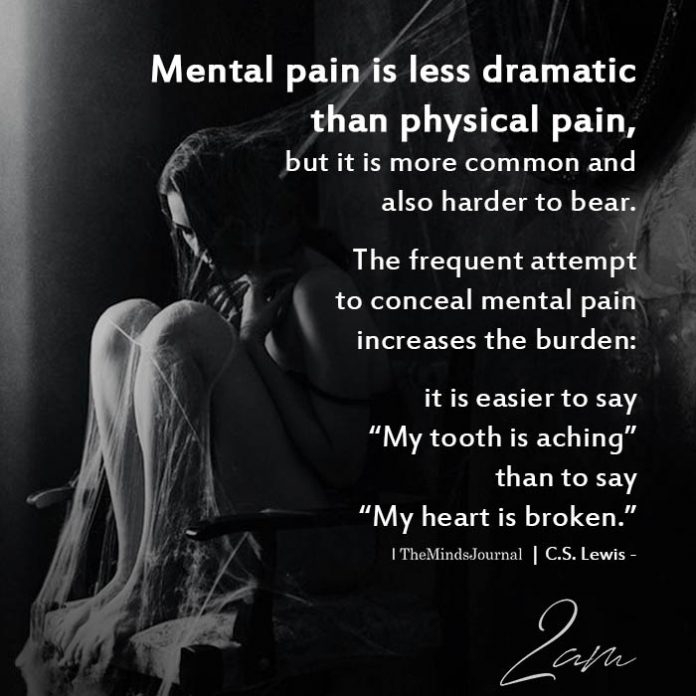
Related: The Spiritual Meanings Behind Physical Aches, Pains And Illnesses
9. You’ve experienced trauma

Did you experience sexual abuse, neglect, physical abuse in childhood or grew up seeing family disputes, or parental separation? If you have not made peace with your past and the horrifying memories still haunt you, then talk therapy is the best choice.
Psychotherapy allows a person to open up, and vent out all the bottled thoughts and memories without any fear of judgment. You will realize how your childhood affects you now.
A therapist can then help you develop new ways of thinking about the traumatic event and process the horrifying thoughts associated with it. Eventually, you can break free from chains of trauma.
The treatment may be time-taking, but the gains can be life-changing and incredibly empowering.
Related: The Reason Emotional Trauma Doesn’t Heal and How to Overcome It
10. You’re avoiding ‘Me’ time
How long it has been since you’ve last indulged in your favorite hobby? If you can’t remember then it is a surefire sign that you’ve been neglecting your alone time. Be it binge-watching Netflix, listening to Eminem, drawing a mandala, blogging, coding, or anything – if it no more gives you joy, then there is something amiss.
Unresolved issues are common in people with anxiety, depression or other mental health problems. Therefore, they no more enjoy their previously beloved activities. There is no point in suffering needlessly.
Talk to a therapist, because a professional can help you feel unstuck, know what you want and make personal changes accordingly.
Related: 7 Science-Backed Reasons Why Spending Time Alone Makes You More Successful
11. You Use Unhealthy Coping Skills
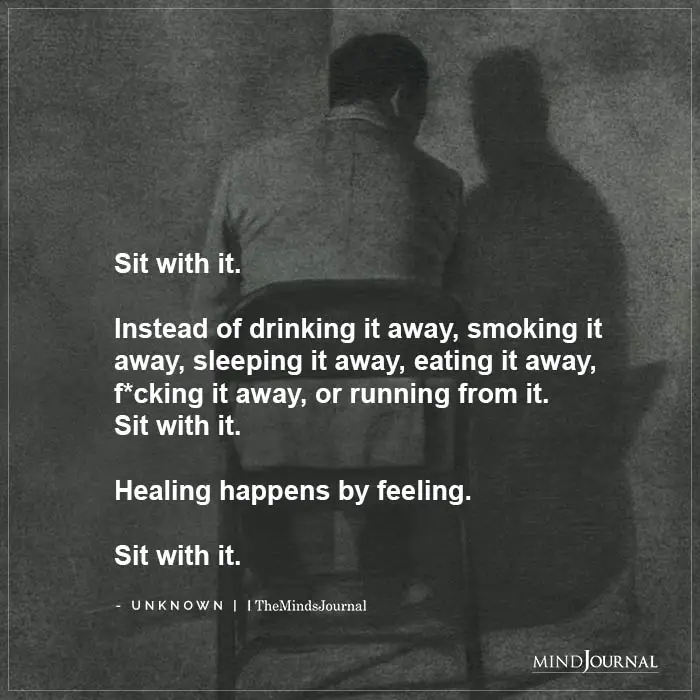
Relying on alcohol, cigarettes, or drugs to escape from the memories of the past trauma is an unhealthy coping skill. You may only get temporary relief while making existing problems worse. Self-defeating behavior indicates severe emotional distress and is linked to borderline personality disorder. Not seeking professional help may introduce new problems into your life.
You may not be able to recognize your self-destructive behavior. But when your loved ones are saying, “I’m concerned about you” – consider it a red flag! Take the advice!
The solution is to face your problems, find their roots, and fix them once and for all. Talk to a therapist today! These professionals are there to make sure you are coping with emotional problems in a healthy way. They will help you return to your healthy or healthier state.
Wrap up
Based on my personal experiences and research, these are some signs that you really need to talk to a therapist. Seeking psychotherapy doesn’t mean you are psycho. It is your right to self-care! You can alleviate your emotional and psychological symptoms, reduce emotional distress, resolve personal issues with the right guidance and support and make positive personal changes to live a better life.
However, seeking the right therapist is important. So, ask your friends and seniors, get multiple recommendations, and make sure to check out different online portals. And, if you are worried about money, there are many affordable options out there.
If you find this post helpful, share it with those you think are in need of therapy.
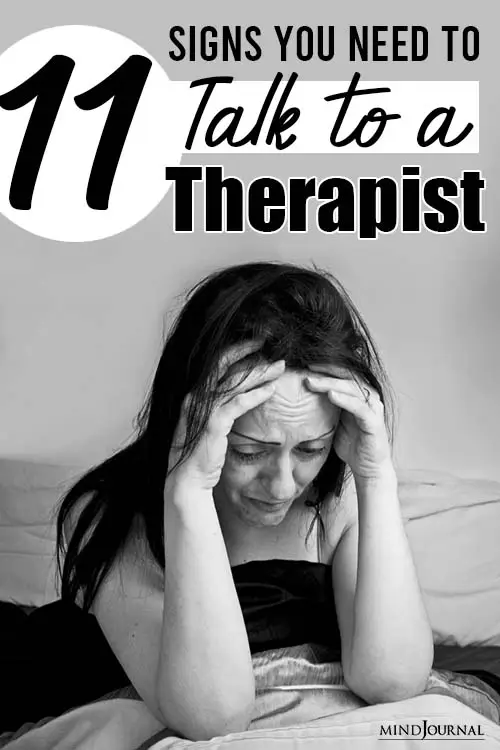
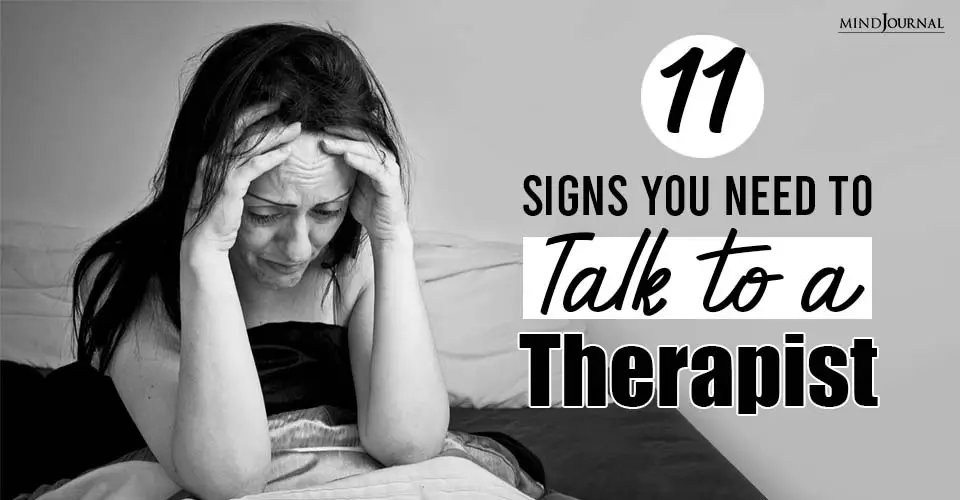






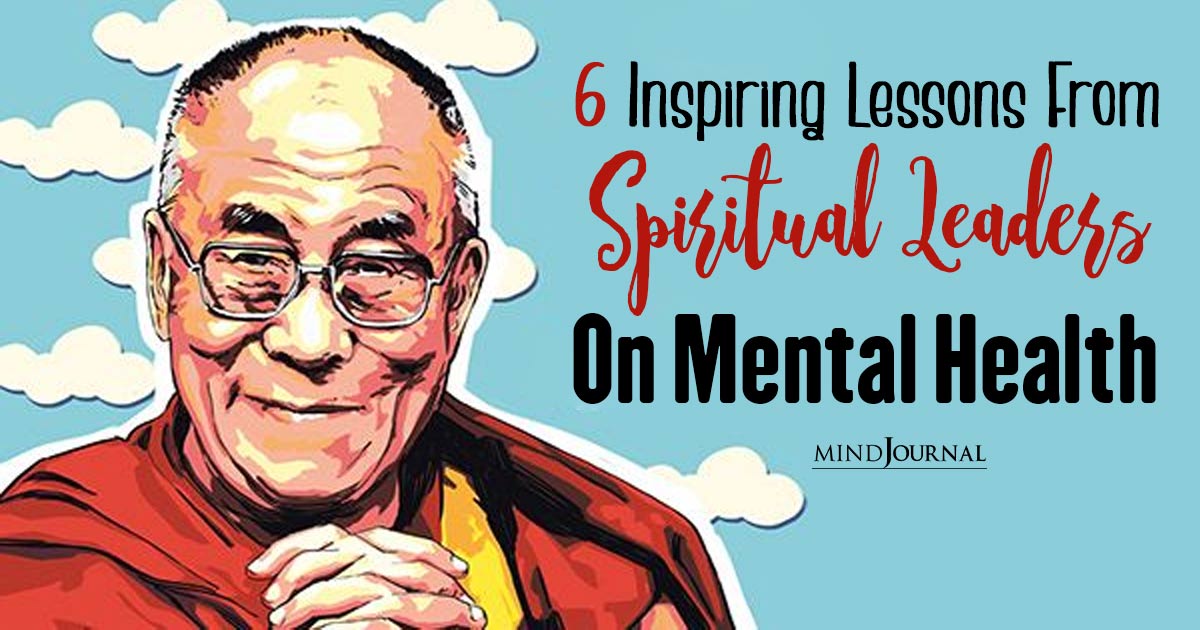
Leave a Reply
You must be logged in to post a comment.